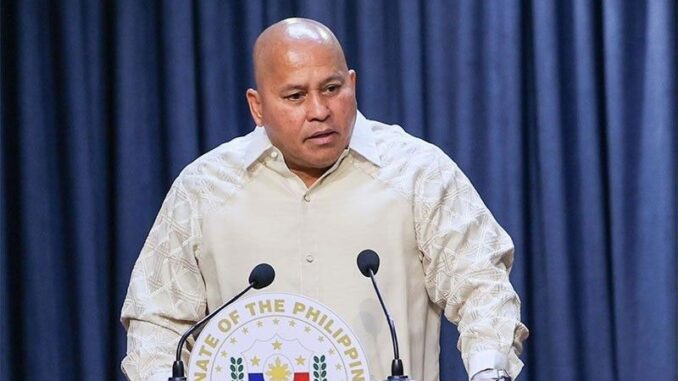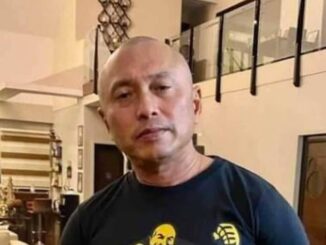
MANILA, Philippines — Considered the architect of the war on drugs, Sen. Ronald dela Rosa vowed to cooperate with the Department of Justice (DOJ) in its probe of possible crimes against humanity committed under Rodrigo Duterte.
Dela Rosa said he respects the jurisdiction of the DOJ, which has formed a task force to look into possible violations of Republic Act 9851 or the 2009 “Philippine Act on Crimes Against International Humanitarian Law, Genocide and Other Crimes Against Humanity.”
“I will cooperate (with the DOJ investigation). I respect their jurisdiction over our territory,” Dela Rosa said in an interview yesterday for The STAR’s “Truth on the Line.”
The DOJ is investigating the alleged extrajudicial killings committed in the bloody crackdown on illegal drugs waged by Duterte.
Dela Rosa maintained his position not to cooperate with the International Criminal Court (ICC), which he said has no jurisdiction over the Philippines.
“I respect the DOJ jurisdiction but not ICC. They do not have jurisdiction over us. If DOJ, I respect their jurisdiction,” he said.
Dela Rosa lamented that the present government has a problem in addressing illegal drugs with drug lords and pushers again acting like toughies in the community. He said the illegal drug problem is back, with shabu now being sold like candies.
The senator, who was the first chief of the Philippine National Police of Duterte, said the information came from local government leaders like governors, mayors, councilors and barangay captains.
“Drug lords who went underground during Duterte’s administration are now back, selling drugs like candies, just like before. With these reports from the ground, it’s clear this government is struggling to address the drug problem,” Dela Rosa said
Defending the Duterte administration’s controversial campaign, Dela Rosa argued that there is no textbook or academic solution to the drug problem.
“There’s no scholarly or classroom solution to the war on drugs. You have to go all out if you want to succeed,” he said. “When you confront the problem, undesirable outcomes are inevitable. The government must address the wrongdoings of those who abuse their authority.”
Dela Rosa admitted there were complexities during the Duterte administration, particularly with rogue cops involved in illegal drug operations. Despite standard operating procedures, he acknowledged the challenge of ensuring accountability within police ranks.
“You can’t expect zero casualties in a war. It’s unrealistic to think that only police officers will suffer casualties while drug personalities go unscathed,” he added.
‘Rejoin ICC’
The country should be a member of the International Criminal Court to hold perpetrators of “grave crimes” accountable, a lawmaker meanwhile urged President Marcos.
“I have taken notice of the recent call from the European Union urging the Philippines to reconsider its withdrawal from the ICC, and to rejoin this important international body,” Batangas 2nd District Rep. Gerville Luistro said in a statement before the weekend.
“Having taken notice of the same, I advocate for the Philippines’ return as a member of the International Criminal Court,” she added.
In 2019, the administration of president Duterte withdrew the country’s membership from the ICC.
Duterte is now the subject of an investigation by the quad committee of the House of Representatives for alleged extrajudicial killings that transpired during his six-year administration, which implemented a war against illegal drugs where thousands were killed.
He is also the subject of an investigation by the ICC for the same issue.
During one of the quad comm hearings, Duterte himself admitted killing several people when he was still mayor of Davao City as part of his cleanup of society.
Luistro said the Duterte administration’s move to depart from the Rome Statute was a “devastating decision.”
“It sent the wrong message to the international community that we were unwilling to uphold the protection and promotion of human rights, which should be inherent to every individual, and displayed the fragility of our democratic institutions,” Luistro said.
“At its core, the withdrawal from the ICC signified to our people that our government’s commitment to international treaties, more importantly to our domestic laws, is malleable enough and can be distorted to the whims of a select few,” she added.
Luistro, a member of the quad comm, said rejoining the ICC would assure the country of a “court of last resort.”
“There must be a court of last resort – which will complement domestic courts – that will investigate and, where warranted, try individuals charged with the gravest crimes of concern to the international community, namely, genocide, war crimes, crimes against humanity and the crime of aggression,” the Batangas congresswoman said.
Luistro said that the country is “a nation of laws, not a nation of men.”
“Rejoining the ICC would reaffirm the country’s commitment to international norms and strengthen its legal framework in holding perpetrators of grave crimes accountable – that, regardless of their status, economic standing, or power, no one is above the law,” she said.
Luistro said as a country committed to justice and the preservation of human rights and human dignity, it is “imperative for the Philippines” to take an unqualified position in its membership in the ICC.





Be the first to comment